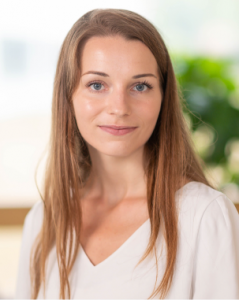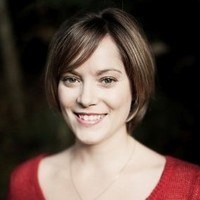 By Morgan Alford, Graduate Student, Hancock Lab
By Morgan Alford, Graduate Student, Hancock Lab
In early November 2019, the Centre for Blood Research proudly presented ‘Breakfast with Bayer,’ a networking opportunity for trainees to meet with representatives from the life sciences company. Bayer is interested in advancing health and nutrition, in the context of our growing, aging population through business in pharmaceuticals, crop sciences, radiology, among other areas. Jennifer Lowther, the Medical Science Liaison (MSL) for the Western region of Canada, presented at the networking event and answered several questions explaining her varied professional tasks in this position. She was delighted to meet over coffee to delve deeper into a few topics about her educational background and skills that make her a stellar MSL with responsibilities that contribute to her role.
Can you tell us a bit about your educational background?
I completed a Bachelor of Science (Hons) in Microbiology & Immunology at Dalhousie University in Halifax, NS and a Masters in Business Administration specializing in strategic management and organizational behaviour at the UBC Sauder School of Business here in Vancouver.
What credentials are traditionally needed to become an MSL?
Traditionally, pharmaceutical companies seek candidates with a PhD or MSc. I have also met people working in the medical and scientific affairs department that have a medical background – pharmacy, nursing and MDs who have decided not to work in clinical practice. Clearly, given my different educational background, this can vary. Education and credentials are important but work experience in the industry can be equally valuable.

Jennifer Lowther
What jobs did you hold prior to your position with Bayer?
I started my career as a clinical research coordinator in a physician’s office and then my first job working directly for a large pharmaceutical company was as a primary care sales representative. Over time, I worked my way through more senior sales roles and eventually had an opportunity to transition to an MSL position. All of this was with the same company, until I eventually made the leap to join Bayer in 2017.
What advice would you give for emerging researchers interested in pursuing similar careers?
As a researcher, you probably have a strong understanding of the science. The next step is to translate that into clinical relevance, and more importantly, to be able to summarize all that knowledge and communicate it effectively to practicing physicians and other researchers in a manner that resonates with them.
People often have experience that is relevant to the MSL role and it’s a matter of identifying that, highlighting it on your resumé and articulating it in the interview. This experience may come from specific projects as part of your research job, volunteer experience, or other part-time jobs. Any time you have given a presentation, faced a road-block to achieving a goal, mentored a peer or student, tried to advance an innovative research idea with your supervisor… you are gaining the same skills that are required to be an effective MSL.
Networking and relationship building are critical skills for an MSL and are just as important for getting that first job in industry. One should focus on building connections with people working in industry, the medical community and recruiters. The more you show these people that you can network with them, the more likely they are to see that you could do it in the job as well.
What kind of daily tasks are associated with your job?
My primary responsibility is to engage with physicians and researchers in scientific discussion. Most of my activities revolve around achieving this, from preparing for the meeting, learning the appropriate material, developing slides and doing the required follow-up afterwards. These meetings are ideally face-to-face. I now cover BC and Alberta, but have also covered all four Western provinces … so I spend a fair amount of time traveling!
In addition to one-on-one meetings, I also support learning events for physicians, and run regional consultation meetings. In order to do these, I am responsible for all the logistics …. think event planning! … but also supporting the speakers by informing them of the audience needs which drives the meeting objectives and by providing relevant scientific information and slides for their presentation.
Outside of that, my tasks vary depending on what projects I may be working on. Currently I am very involved in supporting the training for the sales team, liaising with investigators of our clinical trials when requested by site management or medical research teams, and supporting market access to network with appropriate thought leaders. We also represent the physicians to Bayer, so I’m responsible for taking their research ideas forward and facilitating meetings with the appropriate Bayer staff at the Canadian or Global head office. I also sit on a global committee for MSL Excellence, providing feedback to our global leadership on our MSL needs at the country level. Additionally, I have been the medical lead developing a retrospective research trial across four provinces in Canada which we are now just at the beginning of executing. You can see how much variety we can have in our roles, and truly, everyday is unique.
How much do you travel for work?
A LOT! It can vary through the year where summertime and Christmas are generally slower, and with spring and fall being more intense. Overall, I’m outside of the Vancouver lower mainland for at about 50% of my work time. I travel to cover my territory (BC & Alberta) but also for company meetings, visiting the office in Mississauga and for training or medical conferences. These meetings and conferences are most often still in Canada, but a couple of times each year, I travel to the US or Europe.
Does Bayer offer professional development opportunities for graduate students?
Bayer does offer student and intern positions. The pharmaceutical division office is in Mississauga and we have Crop Science offices in Calgary, Guelph and Winnipeg. The specific position and responsibilities will vary depending on the business demands we have, as it fluctuates with product lifecycles.
What do you hope to achieve outside of your professional goals?
I have a 5, soon to be 6(!) -year old daughter and much of my personal time revolves around her. My top personal goal is to be a great Mom and provide an environment that allows her to thrive. I also spend a fair amount of time working as an officer with the army cadets, a youth program for boys and girls ages 12-18. After having my daughter, I have had to scale back my commitment to them, but I still strive to be a reliable and consistent presence. Similar to my role as a Mom, it’s very rewarding to work with this youth group and watch them grow as they develop leadership skills that will carry them through life. I’m intrinsically motivated by seeing others succeed in whatever they define as success. To me, success is happiness because everyone wants something different and that’s okay. So, I guess my overarching personal goal is to be happy, and to spread happiness. I try to maintain a positive attitude, connect with the people around me and spread contagious smiles. The destination is not always what we thought it would be, so we had better enjoy the journey!
Do you believe in ‘New Year Resolutions’? If so, what is your resolution for 2020?
I do! Around Christmas I usually reflect on the year that has passed and think about the areas in my life that I may have been neglecting. Over the last few years – and 2019 was no exception – I faced a lot of change professionally and personally which meant keeping many balls in the air; some big, some small. When I have too many things on the go, I get burdened by what I call “mental clutter”. So, this year, I’m focused on completing things I have already started or been wanting to do and not letting new ideas or projects butt to the front of the priority line. It’s impossible not to start anything new; the to-do list will never be completely done, but my goal for 2020 is to complete more than I start and clean up that mental clutter!


